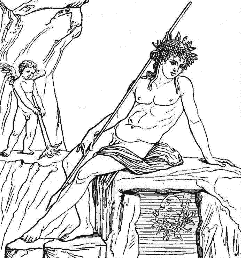
Myth summary: Cursed by Hera for her lies over an indiscretion with Zeus, the nymph Echo lost her voice, save for the ability to parrot someone else’s words. For a long time, she wanders the forests in misery – once spurning the forest god Pan during her roaming – unable to speak at all until one day the winsome Narcissus strolls by. The young man’s handsome appearance shoots Eros’ arrow through the heart of the nymph, and she is smitten. Unfortunately, when she attempts to call out, Echo’s voice catches due to Hera’s curse. Narcissus, meanwhile, stops at a stream to rest and drink. Before he cups the water, he leans over the stream and glimpses his reflection in the water. Never having witnessed such unmatched beauty, Narcissus stares at the image and not only cannot force himself away but has no desire to do so. “I love you,” he avows, and Echo repeats the sentiment to him. Nonetheless, Narcissus continues to be entranced by his own glory. Thirst and hunger eventually consume the man, and he dies. In his place, a flower by his name grows. Echo pines for the man, even after his death, and eventually falls to demise in her own grief. The earth-goddess Gaia preserved Echo’s voice, which, of course, we are still reminded of today.
Commentary: Figuratively, the Fall (of Man) has rendered so many of us much like Narcissus. The world moves around us, some of it to our benefit and some to our detriment, and we hurt others – as Narcissus did in rejecting Echo so dispassionately – when we continually love only ourselves. Retribution and revenge, like Hera’s reaction to Echo, we understand and even dish out similar vitriol from time to time. Come the night, we allow ourselves to sleep because we tell ourselves, “I love you,” over and over again. This myth points out many wrongs: Echo’s affair with Zeus, Hera’s overreaction which may seem justified to a point, Echo’s self pity, and Narcissus’ self-love – not to mention the biggest scoundrel of them all, the high god Zeus, who asks Echo to lie for him (not mentioned above) so he can escape Hera’s wrath unscathed and then never intercedes on Echo’s behalf either during Hera’s cursing or thereafter. No heroes emerge in this tale of woe, but certainly lessons can be learned. The most important one lies with Narcissus (and it could be said for Zeus as well), that being, look outside of yourself. Love others as much as you love yourself – for Christians, it’s the second greatest commandment. Loving yourself and only yourself will eventually eat away at a soul, and people that do this over time become almost a caricature of humanity. The one area of pseudo-redemption here lies with Gaia’s preservation of Echo’s voice for others to know and love. That small consolation resonates as a reminder for us all to take care with our actions lest we succumb to tragedy like the players in this myth.
On a lighter side: For all of Narcissus’ faults – and we may have expected a grungy swamp to develop where he died – the critter ended up with a gorgeous flower commemorating his beauty. Is that the lesson the ancient Greeks wanted to be teaching? Nice job, fellas. More than anyone else, Zeus deserved to be caught and spanked by Hera for his tomfoolery, and it would have been nice to see him rear his ugly head when Pan was trying to infringe on his old squeeze or anytime in poor, little Echo’s wanderings. For Echo, and maybe she was bitten by the “you-can’t-pick-a-man-to-save-your-life” bug, it sure would have helped if she would have fallen in love with someone besides an egomaniac. Who knows? Maybe Pan was her guy after all.
Greek Myth

2 comments:
Could we have the blue dots put over the junk photos?!? Family entertainment, indeed!
Post a Comment